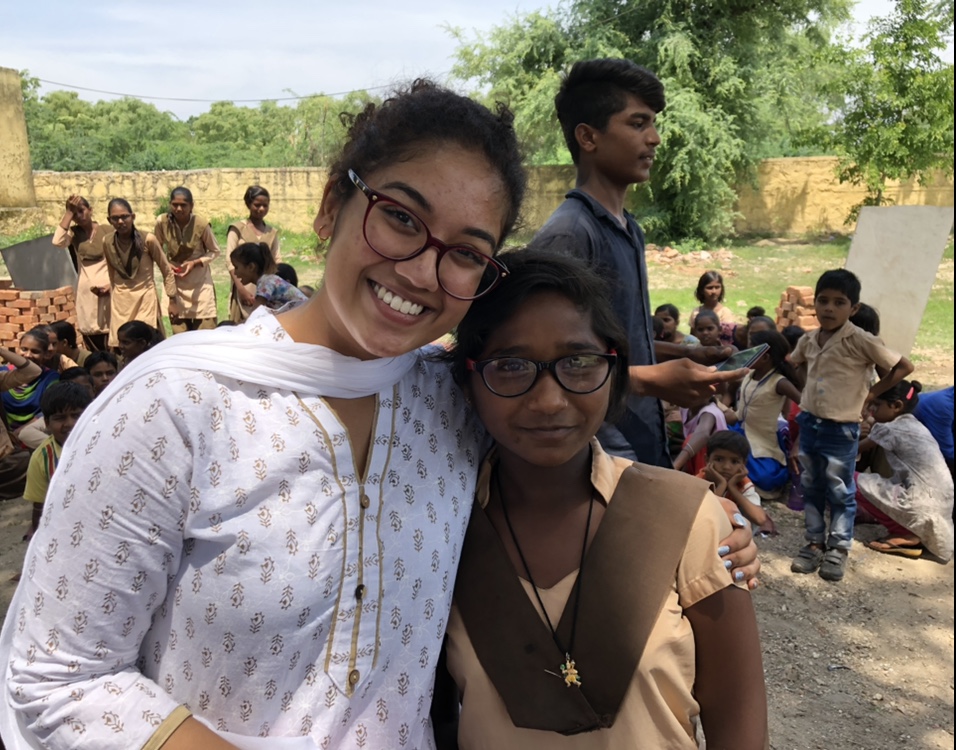A 17-year-old West Windsor-Plainsboro North High School student came to the aid of students in India.
Samyukta ‘Rosie’ Pipada created the nonprofit, 20/20 Vision For All, in 2018 that helps students in India receive eye care after the experience she had while she taught in the city of Kota.
“In the summer of 2018, I was volunteer teaching at Prashanti Vidya Mandir Senior Secondary School teaching English to a class of fourth graders,” Rosie said. “This one girl was getting very close to the black board and [she] told me she could not see the board. After that, three more students started complaining. Four children out of eight in the classroom were complaining about not seeing the board, which [was] very concerning.”
Being that Rosie’s father’s side of the family is from Kota, she had asked her family’s doctor to check the four students’ vision. Eventually, the initial check-up expanded to the entire school, as per the doctor’s suggestion.
“This was a problem that I came face to face with immediately. The reason I selected Kota was because I had seen the demand for glasses first-hand,” she said. “I have just been shocked by the whole experience.”
According to Rosie, 122 students were screened and 20 pairs of glasses were delivered to children of Prashanti Vidya Mandir Senior Secondary School when she began the nonprofit in 2018.
This summer, her nonprofit screened 389 students with 83 pairs of glasses distributed for students across two different schools in the city of Kota – the Government Senior Secondary School for Girls and the Co-Ed Government Secondary School.
In the two years that Rosie’s nonprofit has been in operation, 20/20 Vision For All has done a total of 511 screenings with 103 pairs of glasses delivered to students who need them.
After working at one of the schools in Kota, Rosie had realized certain students were being written off as lazy or unintelligent because certain visual impairments prevented them from excelling in certain parts of the curriculum.
“When we were screening, her the teacher said she can’t read, she is the weakest student,” Rosie explained. “I asked the girl to move up to the board to read so I could reaffirm what the teacher was saying. She went up to the board and read the letters perfectly. That meant this child has been written off as not studious simply because she had a visual impairment.”
Like this one situation, Rosie has encountered similar stories with many other students.
“There are so many children like that who just go unchecked,” she said. “If the children are left unchecked they are unable to move forward and get out of the cycle of poverty. The schools that we go to are very, very poor.”
Each time screenings are conducted at one of the schools an optometrist and ophthalmologist are onsite. Ophthalmologist Dr. SK Gupta and optometrist Prashant Tahiliani offered their services to aid in Rosie’s mission.
“The optometrist has an autorefractor that is a computerized machine that detects the prescription of a student’s eyes. He fits them for glasses. The ophthalmologist is the eye doctor onsite that examines any extreme cases and references them back to his hospital, [if needed].”
Rosie funds her nonprofit out of pocket and works a job over the summer that funds the pairs of glasses and screenings. Optometrist Tahiliani has offered a serious cost reduction on the pairs of glasses for the students. In 2019, each pair of glasses given out to students costs 175 rupees, which is roughly $2.44 each in the United States.
This past summer, the nonprofit went into more remote rural villages on the outskirts of Kota to help the children that are neglected by government aid.
“We had to bring the autorefractor to them and got the prescriptions onsite so the students did not have to worry about going all the way back into the inner city to get the glasses,” Rosie said. “A lot of children have smiles when they receive their glasses but are also hesitant to put them on, because people around do not wear glasses.”
Rosie said that the next step for her nonprofit is to grow and promote the education portion of eye care and wearing glasses. She said to she hopes to be able to make wearing glasses a part of the dress code in with some of the schools in India, because most students wear uniforms to school.
Rosie also explained that this is not just a temporary nonprofit or check on her list. She plans on continue her work with children in India for years to come.
“I feel like a lot of people spend a lot of their lives looking for passion and meaning. I feel like I am really lucky to have found it when I was 16,” she said. “If it had not smacked me in the face like it did in 2018, I would not be here and helping all of these students. This all happened because one fourth grader spoke up.”
For more information about 20/20 Vision For All, visit www.2020visionforall.org.

